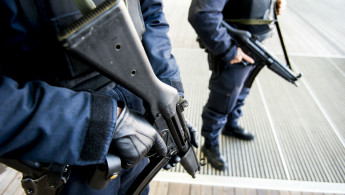Dutch detain two suspected jihadists back from Turkey
Two suspected jihadist fighters were detained by Dutch authorities on Tuesday after they returned from Turkey where they had been sentenced for terror-related activities, prosecutors said.
The two Dutch nationals, identified by local media as Reda Nidalha and Oussama H. "were detained upon their arrival at Schiphol airport," the public prosecution service said in a statement.
A Turkish court sentenced the men to six years behind bars in May following their arrests in 2016, after they came across the Syrian border back to Turkey.
The men, both 23, allegedly joined the Islamic State Group in 2014, but later decided they wanted to go back to the Netherlands.
"They were on their way to a Dutch diplomatic post when they were arrested by Turkish authorities," the NOS public newscaster said.
The men are appealing the sentence and were out on bail. They were given permission to travel to the Netherlands while awaiting the outcome of their appeal in Turkey, but at the same time they will also be put on trial by a local court, prosecutors said.
The pair will make a preliminary appearance before a Dutch judge later in the week, the prosecution statement said.
Meanwhile the Dutch government also asked Kurdish authorities Tuesday to hand over three women who are currently being held in camps in northern Syria.
"Prosecutors are now waiting for a reaction from the Kurdish side," the NOS said.
Of around 280 people who have left the Netherlands since the start of Syria's civil war in 2011 to join jihadist groups, about 185 were still in the region, the Dutch intelligence and security agency AIVD said.
Terror funding
In April, French President Emmanuel Macron warned that militants "use all contemporary forms of financing" in an address at the closing of a two-day conference on combating the funding of terror groups at the Organisation for Economic Cooperation and Development (OECD), which brought together around 80 ministers and 500 experts.
"We have to cut off terrorism at its roots: it feeds on human trafficking, drugs and weapons. There's always an underlying economy," said Macron, urging global "transparency and mobilisation."
"We have to cross to a new stage in the fight against Daesh and al-Qaeda,” he said, using the Arabic acronym for the Islamic State militant group.
A French presidential official briefing journalists ahead of the terror funding conference said that IS income was estimated at about one billion dollars (820 million euros) a year between 2014-2016.
Most of this was from local taxation, oil revenues and looting, with far smaller amounts flowing in from overseas donors.
IS swept across large parts of Syria and neighbouring Iraq in 2014, declaring a cross-border "caliphate" in areas they controlled.
Syrian and Iraqi forces have since driven IS from nearly all the territory it once held, except for a small presence in the remote desert areas along the border.
But French officials are concerned that the money has been transferred out of Syria and Iraq and could be used to rebuild the organisation.
"It has been moved since, at least in part. It's probably somewhere," the official said on condition of anonymity. "These groups are very skilful in using sophisticated techniques to move financial resources around."





 Follow the Middle East's top stories in English at The New Arab on Google News
Follow the Middle East's top stories in English at The New Arab on Google News


